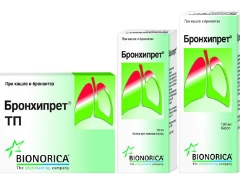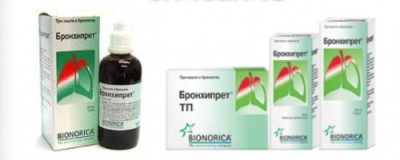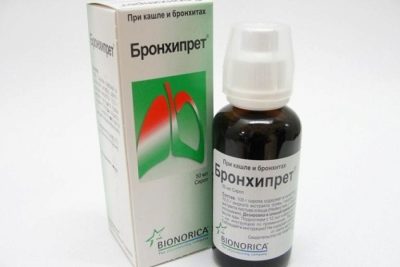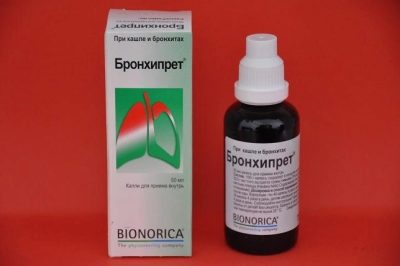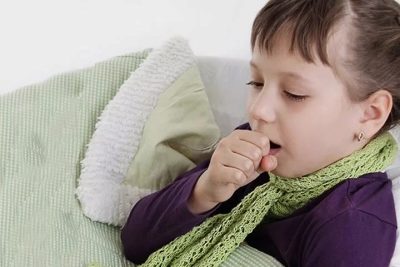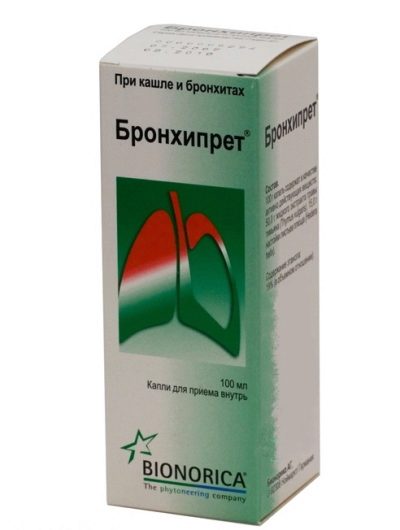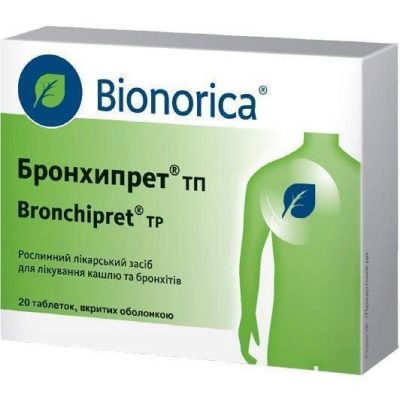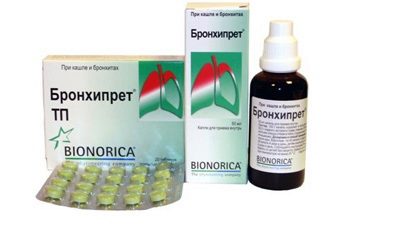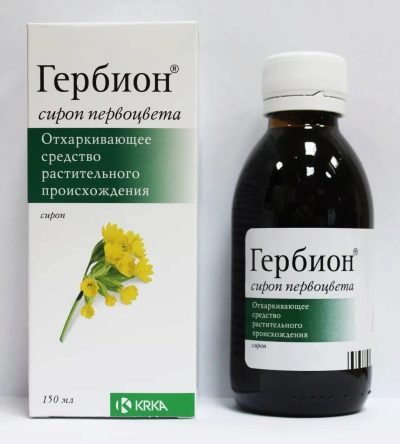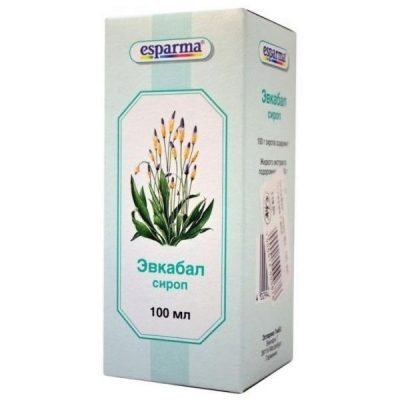Bronchipret for children: instructions for use
Choosing cough medicine for children, many mothers prefer herbal preparations. One of these tools can be called Bronchipret. When can they assign a child and how to take it correctly?
Release form
Bronchipret is available in two versions:
- Syrup. It is a light-brown liquid smelling like thyme, containing 50 or 100 ml in one bottle. Often the syrup is clear, but when stored in it a slight precipitate may appear, which does not impair the properties of the preparation. In the bottle there is a metering device with which you can count drops. The package also contains a measuring cup.
- Drops. This form of Bronchipret is also a fragrant transparent liquid of light brown color, packaged in bottles of 50 and 100 ml each, equipped with a dropping device. The main difference of this drug is a higher content of active ingredients.
We should also mention the drug Bronchipret TP, which is produced in tablets in the shell. He has a similar effect, but a slightly different composition. These tablets differ in green color and a convex rounded shape. One pack contains from 20 to 100 such tablets.
Composition
The basis in the liquid forms of Bronchipret is a combination of plant extracts. One of them is derived from thyme herb, and the second from ivy leaves. Their content per 100 g is as follows:
In syrup: | In drops: |
15 g thyme extract 1.5 g of ivy extract | 50 g thyme extract 15 g of ivy tincture |
Both drugs also include ethanol, which contains 7% of the volume of the drug in syrup, and 19% in drops. Also the same excipients for the drops, and for the syrup are purified water and citric acid in the form of monohydrate. In addition to such components, the syrup contains potassium sorbate and maltitol, and saccharin acts as a sweetener in the form of drops.
Tablets Bronchipret TP is made from dry extracts obtained from thyme and primrose root. They include MCC, talc, lactose, dextrose, PVP and other components.
Operating principle
Bronchipret belongs to the group of herbal medicines with expectorant action. His reception has such an effect:
- Reduced viscosity of bronchial secretions.
- Accelerating the removal of mucus from the respiratory tract.
- The expansion of the bronchi.
- Reduction of the inflammatory process.
Indications
Instructions for use Bronchipret indicates that the drug is prescribed for various acute or chronic diseases of the respiratory system. The drug is indicated for an unproductive dry cough, when the sputum is very viscous and difficult to separate. Especially it is often prescribed for bronchitis, laryngitis, tracheitis, as well as for laryngotracheitis and tracheobronchitis.
At what age is it allowed to take?
The use of Bronchipret syrup in children is permissible from 3 months, but it is not recommended to give such medicine to babies up to a year without consulting a pediatrician. Bronchipret in drops is prescribed to children who have turned 6 years old.The tablet form (Bronchipret TP) is used in the treatment of children over 12 years old.
Contraindications
The use of Bronchipret is prohibited in case of hypersensitivity to any component of the drug. Due to the presence of ethyl alcohol in the composition of the drug also requires careful appointment to children with brain pathologies or liver disease. Tablets Bronchipret TP is not prescribed for diseases of the digestive tract in the acute phase, as well as for problems with the digestion of lactose.
Side effects
The body of some young patients respond to treatment with Bronchipret allergies. Other adverse reactions from taking such a tool is not detected.
Instructions for use
Syrup
The medicine should be shaken up before each use, after which the child should be taken undiluted after meals and washed down with a small amount of water. Medication prescribed on average for 10-14 days. The frequency of use of the syrup is three times a day, and a single dosage is calculated based on both the weight and the age of the child.
Children from 3 to 12 months are given at one time 10-16 drops of syrup. To calculate the dose for a child older than a year, you can either add to the drop of 17 drops of 3 drops for each additional year of life, or add to the drop of 10 drops as many drops as the kilogram weighs the child.
Also, to determine the single dosage, you can use the measuring cup, which is sold with a bottle of medicine. Syrup should be recruited to this mark:
Children up to a year | 1.1 ml |
Babies 12-24 months | 2.2 ml |
Children 2-6 years old | 3.2 ml |
Children 6-12 years old | 4.3 ml |
A child over 12 years old | 5.4 ml |
Drops
Bronchipret in this form is taken after meals four times a day. The duration of treatment is also 10-14 days, but if necessary, the doctor can continue therapy. The number of drops per dose depends on the age:
At 6-11 years old | 25 drops |
12-18 years old | 28 drops |
Pills
A single dose of the drug Bronhipret TP is 1 tablet. Children over 12 years old are offered to swallow it before eating without chewing, then drink water. The medicine is given three times a day for 10-14 days.
Overdose
The use of Bronchipret in too high a dose provokes abdominal pain, vomiting or thinning of the stool. When these symptoms occur, treatment is prescribed to help eliminate them.
Interaction with other drugs
The drug can be administered with antibacterial agents. Treatment with any form of Bronchipret is not combined with the use of antitussive drugs, so as not to cause sputum stagnation in the respiratory tract.
Storage conditions and shelf life
To store syrup or drops, you need to find a place where the direct rays of the sun will not fall, and the temperature does not rise more than 25 degrees. Keep the bottle away from children. The shelf life of syrup and drops is a period of 3 years. The storage conditions of Bronchipret TP tablets and the shelf life of this form are similar to liquid types of medicine.
Terms of sale
Purchasing Bronchipret in a pharmacy does not require a prescription. The average price of one 50 ml syrup bottle varies from 180 to 200 rubles, and a bottle of 100 ml costs 330-380 rubles. A pack of 20 tablets of Bronchipret TP costs from 290 to 330 rubles.
Reviews
Treatment of Bronchipret cough in children most often turns out to be effective, so most mothers speak of such a drug well. They confirm the low incidence of side effects, but sometimes complain of an allergic reaction. In addition, in some babies the use of the drug does not have the desired effect. In this case, the taste of the drug in most babies does not cause rejection.
Analogs
If you need to replace Bronchipret with another herbal medicine that helps with coughing, you can use as an analogue:
- Dry cough mixture. This medicine contains Althea extract, anise oil, licorice extract and other components. The drug may be prescribed by a doctor to babies of the first year of life.
- Herbion syrups. Under this name produce several syrups, used when coughing. One of them is based on ivy extract, the second contains thyme and primrose, the third is made from mallow and plantain. Such syrups are prescribed from 2 years of age.
- Eucabal syrup The main ingredients in this preparation are plantain and thyme. The tool is used in the treatment of children older than 6 months.
- Gedelix syrup or Prospan. Both of these drugs are made on the basis of ivy leaves and used from birth.
- Altea syrup or licorice. Such sweet herbal remedies have long been used in the treatment of cough in children, including babies in the first year of life.
In addition, non-herbal medicines with expectorant action, for example, drugs based on carbocysteine, ambroxol, bromhexine, or acetylcysteine, may also become a Bronchipret substitute.
And in the next video you can see how to treat another child’s cough.
